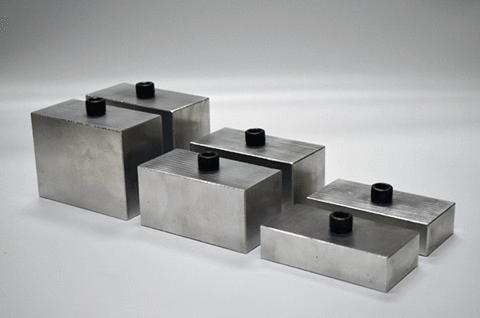Trailer Tech: Aluminum Billets
Welcome to Trailer Tech!
We first launched Trailer Tech on our blog as a forum to discuss matters related to maintenance and automotive technology. Today, we're going to be kicking things off with with one of the first major questions that was asked of us when we began Trailer Blocks. We'll be talking about why we use the kind of aluminum that we do and why we don't pursue alternatives.

Our lineup of signature 6061-T6 Aluminum Lift/Lowering Blocks
Since we started production, our aluminum lift/lowering blocks have been made from 6061-T6 aluminum billets. Although we stand by the use of billets, there has been something of a debate as to whether or not it's worth investigating the possibility of using cast metal instead. After careful deliberation, we ultimately found far too many potential issues that can arise from a cast metal block and the stability of a solid billet was unparalleled for our use. Structural defects are more likely to occur during the casting process; such as the presence of inclusions (foreign materials cast into the metal), lower elongation and shear strength as well as random soft spots along the finished product, leaving the final block more brittle as a result. It goes without saying that a brittle product has no business being attached to your trailer, so we actively avoid using cast parts in our process.
Lifting / Lowering - achieved by inserting material in between the leaf spring and the axle on the trailer suspension.
Billet aluminum, on the other hand, is far more effective at keeping inclusions or other potential errors at bay. As its being created at the mill, the billet is continuously cast using rollers which help ensure a uniform size while keeping the metal effectively free from inclusions or other defects. We wanted to go one step further ensuring the block's overall strength, so we decided on the T6 aluminum mainly due to its tempering process. T6 is tempered via a method known as "precipitation hardening" which increases the yield strength of the aluminum. As it's been allowed to settle uniformly, the precipitates in the metal impedes the movement of dislocations which are generally where deformations are found, Upon completion of the hardening, the finished product (billet) can be nearly twice as solid as cast aluminum. In the end, we're left with a more stable product to use and craft.
We've also noticed that many lift/lowering blocks being used today tend to have large, milled out sections in them, often in the name of reducing overall weight of the block. While there might be some merit to this method, we have found that cutting out sections of an aluminum block reduces the overall structural integrity and undercuts its potential strength far more than it's worth. Lift/lowering blocks need to withstand tremendous force and weight at all times of use and we feel that there just isn't a call to cut corners where it doesn't need to happen.
Ultimately, using the 6061-T6 aluminum billets for our blocks makes the most sense as it is a strong, uniform metal that ensures a better product and reduces the potential risks that come with alternative methods.
We hope you've enjoyed this entry of Trailer Tech and the insight into our metal choices. If you have suggestions for future topics, feel free to comment and let us know.
Thanks for reading!